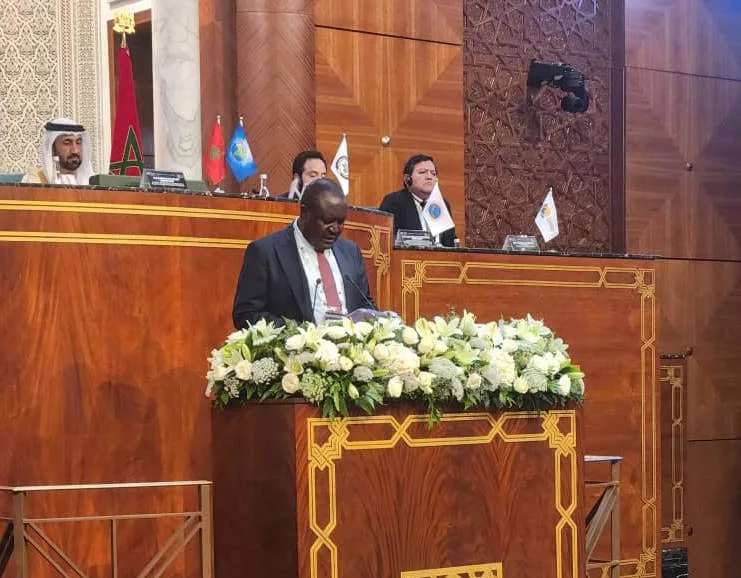|
Getting your Trinity Audio player ready...
|
Chief Fortune Charumbira, the President of the Pan African Parliament (PAP) in his address at the official opening of the South-South Parliamentary Dialogue Forum in Rabat, Morocco, has emboldened legislators to uphold peace and promote sustainable development in the Global South.
“The Pan African Parliament (PAP), serves as the supreme continental representative institution that stands for and carries the voice and aspirations of the people of Africa in the decision-making processes of the Union. It is, therefore, befitting that any forum that brings together the Global South should of necessity include the elected representatives of African Member States who make up the majority of the membership of the Global South.
“It is, therefore, befitting that the PAP is an integral part of this esteemed gathering which seeks to produce actionable recommendations and practical decisions, particularly regarding the role of interregional parliamentary dialogue in addressing the growing challenges of international cooperation, promoting economic integration and joint development, and ultimately laying the foundations for peace, stability, and genuine collaboration across the Global South,” Chief Charumbira said.
This Third Edition of the South-South Parliamentary Dialogue Forum is running under the Theme: “Interregional and Continental Dialogues Among Global South Countries as a Key Lever for Addressing New Challenges to International Cooperation and Achieving Peace, Security, Stability, and Shared Development.”
The House of Councillors of the Kingdom of Morocco, in collaboration with the Association of Senates, Shoora, and Equivalent Councils in Africa and the Arab World (ASSECAA), are the organizers of the third edition of the South-South Parliamentary Dialogue Forum.
This significant event is being held at the headquarters of the House of Councillors in Rabat, the capital of the Kingdom of Morocco, on April 28–29, 2025.
The forum is being organized out of belief in the importance of exchanging ideas, fostering dialogue, and consulting on pressing strategic issues currently shaping policymaking. At the forefront of these priorities are matters related to the economy, development, and trade. The gathering aims to produce actionable recommendations and practical decisions, particularly regarding the role of interregional parliamentary dialogue in addressing the growing challenges of international cooperation, promoting economic integration and joint development, and ultimately laying the foundations for peace, stability, and genuine collaboration across the Global South.
This initiative also reaffirms the urgency of strengthening South-South cooperation and fostering joint action among legislative institutions, especially in light of the successive crises facing the world today. It is driven by a firm conviction that interregional and continental dialogue, alongside increased cooperation among Global South nations, represents a vital tool for achieving economic integration, enhancing the global positioning of Southern economies, and contributing meaningfully to the realization of the Sustainable Development Goals (SDGs).
In response to increasing conflicts in the Global South, Chief Charumbira said Parliamentary diplomacy has increasingly become a globally accepted formal and informal intervention strategy in conflict situations.
“It must be borne in mind that MPs represent people residing in conflict areas so we should be coming up with ideas on how we can leverage Parliamentary Diplomacy to mitigate conflicts. Presidents of the Senate, who are often wisened statesmen, should be seen to be actively engaging both formally and informally to promote peace and security in the Global South. This is a challenge that I throw to all of us,” he said.
The PAP President revealed that the escalating scourge of corruption in Africa is an indictment on national Parliaments.
“Parliaments as institutions of oversight and accountability have the power to take governments and even private institutions and individuals to task for fuelling corrupt activities. However, the fact that most nations have deemed it prudent to establish anticorruption entities points to Parliament’s failure to effectively play this role.
“As Parliaments, we have witnessed our roles, functions and powers being progressively whittled down by the establishment of independent commissions in one form or the other which do what Parliament ought to do. This calls on Parliaments to earnestly self-introspect and take action to restore and reaffirm our role on the demand side of accountability and demonstrate that we have enough teeth to bite the debilitating scourge of corruption.”
Regarding trade, Chief Charumbira said the Afican Continental Free Trade Area (AfCFTA) seeks to eliminate trade barriers and boost intra-Africa trade.
He said it aims to advance trade in value-added production across all service sectors of the African Economy.
“The AfCFTA will contribute to establishing regional value chains in Africa, enabling investment and job creation. The practical implementation of the AfCFTA has the potential to foster industrialisation, job creation, and investment, thus enhancing the competitiveness of Africa in the medium to long term. The envisaged single continental market is expected to increase intra-African trade by 52.3 per cent and the World Bank estimates that the AfCFTA will increase Africa’s income by $450 billion by 2035 and increase intra-African exports by more than 81 per cent.”






